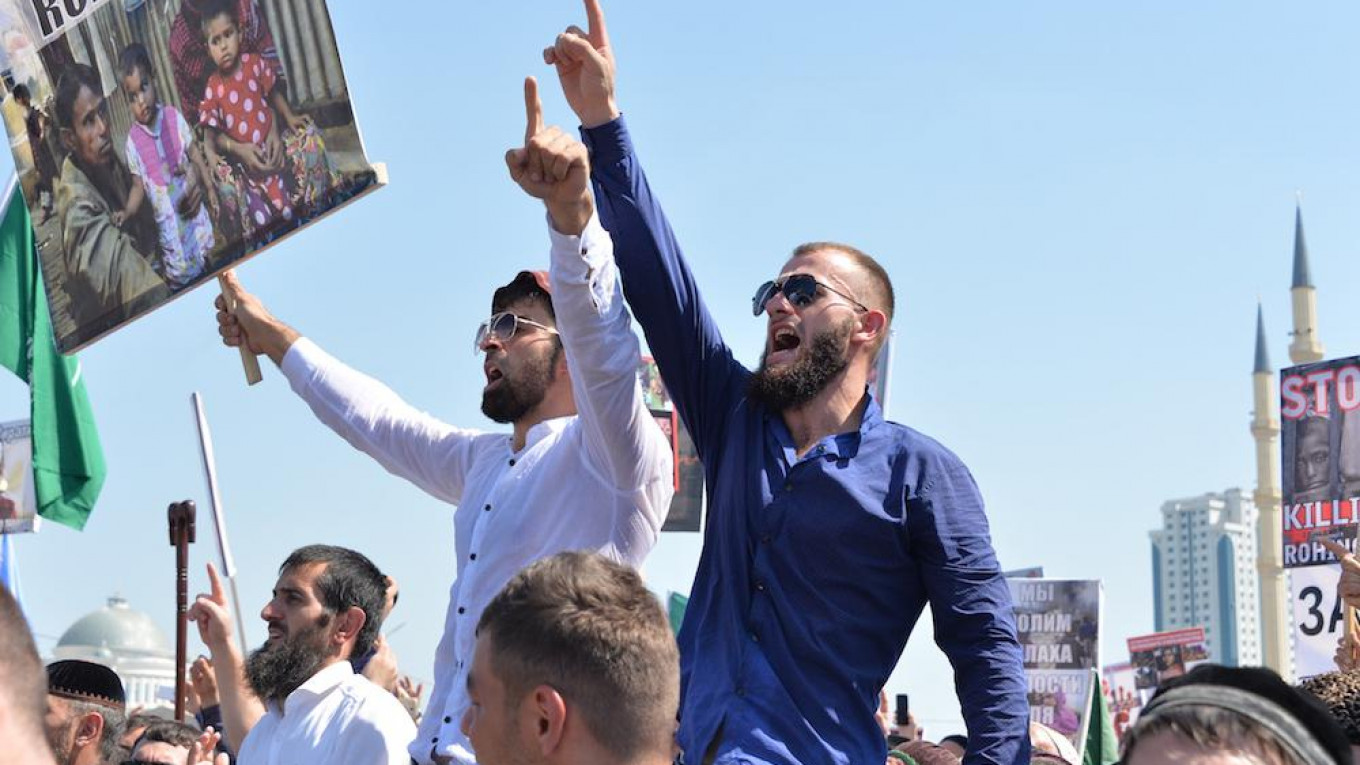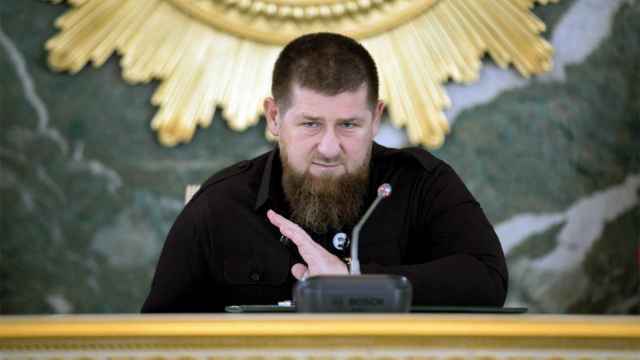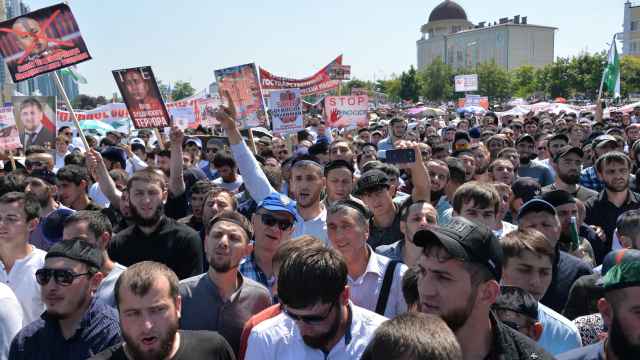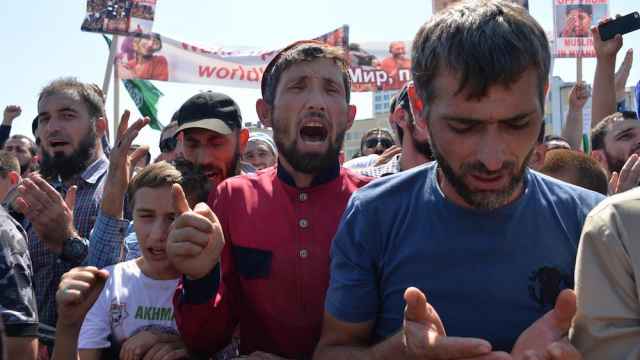The North Caucasus is making headlines again. The reason is not a savage terrorist attack, interethnic conflict, or even the dismissal of a leading official in one of the region’s national republics. This time, it’s Myanmar.
Demonstrators this week staged unauthorized rallies in Moscow, Chechnya’s capital Grozny, Dagestan’s Makhachkala and other parts of the North Caucasus over the persecution of the Rohingya Muslim population in the southeast Asian country.
Chechen leader Ramzan Kadyrov described the events as a “humanitarian catastrophe” and called for solidarity with the Rohingya, even as “the world remained silent.”
It isn’t a coincidence that the demonstrations were held not only in the North Caucasus, but also in the Russian capital. In the last 15 years, Chechnya’s integration has brought Moscow closer to Grozny and has made Grozny more a part of Moscow.
But that integration poses a number of pressing questions for Moscow, from the degree of independence it should grant regional leaders, to local bonds in the North Caucasus and the potential for conflict between religious and state loyalties.
Of religion and state
The strong reaction to the persecution of the Rohingya came as a surprise. Crimea, Donbass, and Syria have all overshadowed the North Caucasus since 2014. This is not only because state propaganda shifted focus, but also because the region has suffered fewer terrorist attacks than in the mid-2000s.
What’s more, the so-called “Caucasus Emirate” and its infrastructure have almost been completely destroyed and most of its underground leaders have been killed.
Since 2013, North Caucasus jihadists have not committed a terrorist act outside the region on the same scale as earlier attacks on the Moscow metro, Domodedovo Airport, or transport in Volgograd.
Despite this, the surge of public protests should come as no surprise. It is a result of not only autonomous decision-making and a hands-off approach by Moscow to many Chechen affairs, but also of freedom of ideology and, to some extent, foreign policy.
In the West, Chechnya is described as a region closed off to the outside world. However, since 2015, Kadyrov has visited Saudi Arabia, the United Arab Emirates, and Bahrain, and hosted Afghan politician General Abdul Rashid Dostum.
At a Jan. 19 rally in 2005 over the French publication Charlie Hebdo, Kadyrov said at a large gathering in central Grozny that, “the people are showing the whole world that we will not allow Islam to be joked with, that we will not stand for insulting the feelings of Muslims.”
Those sentiments found many sympathetic listeners beyond the North Caucasus, with the Chechen capital becoming a kind of platform for the “We are not Charlie” movement.
The theory of a confrontation between an “archaic Caucasus” and an “advanced Russia” is an oversimplification, especially since Kadyrov has gained experience as a public politician who voices his own interests as well as those in Russia who oppose the approach taken by the U.S. and EU.
Chechnya’s “special status” and “national distinctness” render Russia, a multi-ethnic and multi-faith country, with an opportunity to carry out its foreign policy through channels other than its Foreign Ministry.
Kadyrov, who is known as the “defender of Muslims” and at the same time as an enemy of Islamic State*, elicits greater trust as a negotiating partner with an Afghan general or with Arab sheikhs and princes than would the usual Moscow university graduate who, out of bureaucratic necessity, is charged with overseeing the Middle East desk.
However, as alluring as this prospect might appear, there is a clear contradiction between the overall interests of the state and strictly religious and regional interests.
Russia, which could equally position itself as central to Turkic and Islamic world, also has a significant Buddhist population.
Protesters chanted the slogan “Buddhists are terrorists” at the rallies in Moscow and an openly incendiary appeal to “Start with Kalmykia” made the rounds on social networks. Keep in mind that Kalmykia borders Dagestan, the largest of the North Caucasus republics, and is home to many Dagestani émigrés.
Moscow must show restraint in its reaction to Myanmar if it wants to strengthen relations with Beijing. It cannot directly link own its approach to that of the North Caucasus because it needs to retain greater flexibility and nuance.
This gives rise to a serious question: How can it avoid losing the confidence of the citizens, but also of regional leaders who have made a certain personal investment in the politicization of religion?
Russian political nation
Although Moscow proclaims the idea of the “Russian political nation,” it has done little to carry it out in practice.
Moscow wagered that it could keep the Caucasus in line simply by securing its loyalty. So it never bothered to establish a proper balance between the religious and secular elements of society.
That led to a rapid decline in the secular discourse in politics, media, and education, with the result that members of the current generation identify themselves with the larger Islamic world much more closely than their fathers and grandfathers ever did, and take its shifting fortunes very much to heart.
These young adherents express their religious interest in a variety of ways, from taking part in theological disputes and acquiring a high-quality Islamic education abroad to fighting in conflicts in the Middle East.
The North Caucasus’ reaction to the situation in Myanmar is not an isolated phenomenon among Russia’s regions. These republics are not a ghetto or ethnographic reserve, but a territory where the problems and concerns of the entire country are especially pronounced.
It is impossible to build a strong state if Moscow does not become an effective arbiter and mediator between the country’s diverse peoples and regions, and set clear ground rules of what is, and is not permissible.
Russian officials have yet to clearly enunciate the risks inherent in the Southeast Asian conflict, its connection to Russia as a whole or in part, or the nature of Russia’s interests in the matter.
That silence creates a vacuum that other ideologies quickly fill. The specter of Myanmar in the Russian Caucasus serves as a reminder that Moscow, in addition to bickering with Washington and Brussels, need to start paying attention to domestic political problems.
Such a focus needs to be meaningful, and not only part of an election campaign or a tally of votes on the president’s annual live call-in show.
..................................................................................................................................................
An unabridged version of this article was originally published by the Carnegie Moscow Center.
The views and opinions expressed in opinion pieces do not necessarily reflect the position of The Moscow Times.
*Islamic State is a terrorist organization banned in Russia.
A Message from The Moscow Times:
Dear readers,
We are facing unprecedented challenges. Russia's Prosecutor General's Office has designated The Moscow Times as an "undesirable" organization, criminalizing our work and putting our staff at risk of prosecution. This follows our earlier unjust labeling as a "foreign agent."
These actions are direct attempts to silence independent journalism in Russia. The authorities claim our work "discredits the decisions of the Russian leadership." We see things differently: we strive to provide accurate, unbiased reporting on Russia.
We, the journalists of The Moscow Times, refuse to be silenced. But to continue our work, we need your help.
Your support, no matter how small, makes a world of difference. If you can, please support us monthly starting from just $2. It's quick to set up, and every contribution makes a significant impact.
By supporting The Moscow Times, you're defending open, independent journalism in the face of repression. Thank you for standing with us.
Remind me later.








